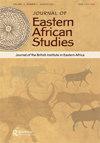Cuba’s involvement in and against the Eritrean liberation struggle: a history and historiography
IF 0.6
3区 社会学
Q2 AREA STUDIES
引用次数: 0
Abstract
ABSTRACT The growing availability of previously declassified material on the Cold War has allowed scholars to revisit old questions with new, more decisive, evidence. In this paper, we draw on this archival material to address the unresolved question of what Cuba’s involvement against the Eritrean Liberation struggle consisted of in the late 1970s, and importantly why they engaged in this way, given a historical commitment to the Eritrean Liberation movement’s goals. While a seemingly minor point in a protracted 30-year struggle for Eritrean independence, we argue that clarifying this matters for several reasons, not least that Cuban support for the Ethiopian offensive against the Eritreans was seemingly pivotal for temporarily reversing the fighters’ major gains in the late 1970s, meaning fifteen more years of fighting until Eritrea’s de facto independence was secured. Drawing upon excerpts from the first author’s original book manuscript on this topic, we also suggest that the effects of Havana’s and other government’s denial of Cuba’s involvement in suppressing the Eritrean struggle contributed to the sense of betrayal and distrust that still haunts Eritrean politics and its leadership, as well as those Eritrean liberation fighters who experienced their staunch ally turn into an ideological and material adversary.古巴参与和反对厄立特里亚解放斗争:历史和史学
关于冷战的解密材料越来越多,这使得学者们可以用新的、更有决定性的证据来重新审视老问题。在本文中,我们利用这些档案材料来解决古巴在20世纪70年代末参与反对厄立特里亚解放斗争的未解决问题,以及重要的是,鉴于对厄立特里亚解放运动目标的历史承诺,他们为什么以这种方式参与。虽然在厄立特里亚长达30年的独立斗争中,这似乎是一个微不足道的问题,但我们认为,澄清这一点有几个原因,尤其是古巴对埃塞俄比亚对厄立特里亚人的进攻的支持似乎是暂时扭转战斗人员在20世纪70年代末取得的主要成果的关键,这意味着15年的战斗,直到厄立特里亚事实上的独立得到保障。根据第一作者关于这一主题的原始书籍手稿摘录,我们还认为,哈瓦那和其他政府否认古巴参与镇压厄立特里亚斗争的影响造成了背叛和不信任的感觉,这种感觉仍然困扰着厄立特里亚政治及其领导层,以及厄立特里亚解放战士,他们经历了他们坚定的盟友变成了意识形态和物质上的对手。
本文章由计算机程序翻译,如有差异,请以英文原文为准。
求助全文
约1分钟内获得全文
求助全文
来源期刊

Journal of Eastern African Studies
AREA STUDIES-
CiteScore
3.30
自引率
7.10%
发文量
12
期刊介绍:
Journal of Eastern African Studies is an international publication of the British Institute in Eastern Africa, published four times each year. It aims to promote fresh scholarly enquiry on the region from within the humanities and the social sciences, and to encourage work that communicates across disciplinary boundaries. It seeks to foster inter-disciplinary analysis, strong comparative perspectives, and research employing the most significant theoretical or methodological approaches for the region.
 求助内容:
求助内容: 应助结果提醒方式:
应助结果提醒方式:


